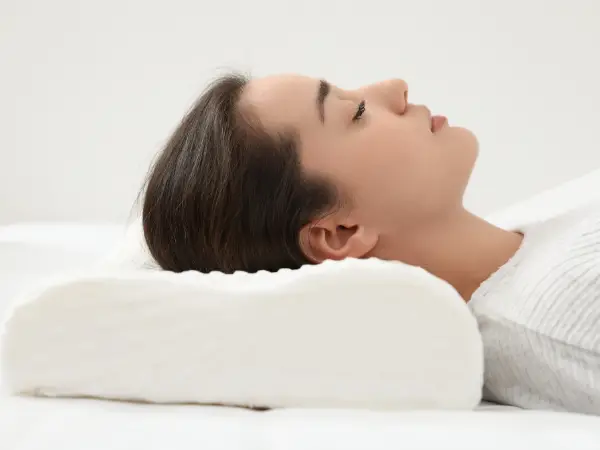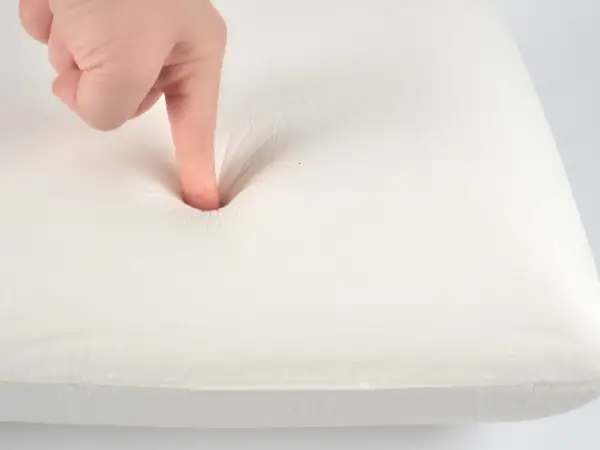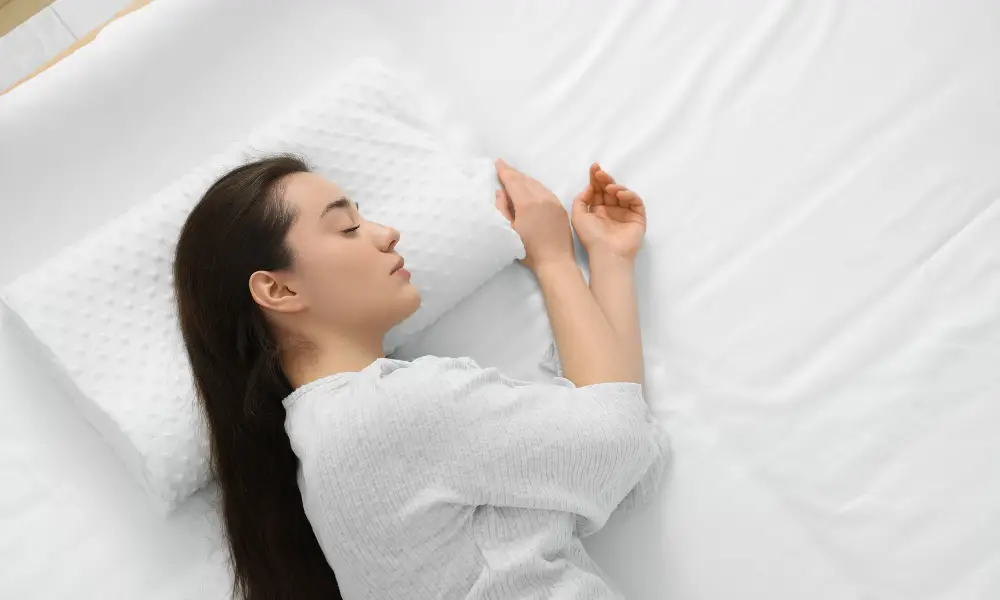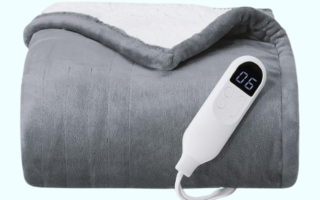A dense memory foam pillow does not directly cause tinnitus. Tinnitus may result from various other factors.
Tinnitus, a persistent ringing or buzzing in the ears, can stem from multiple causes, including exposure to loud noises, ear infections, or certain medications. While a dense memory foam pillow provides excellent support and comfort, it does not directly contribute to tinnitus.
Table of Contents
Tinnitus Basics
Tinnitus Basics is a crucial topic to understand before diving into whether dense memory foam pillows can cause tinnitus. Tinnitus is a condition often described as ringing in the ears. It can range from a minor nuisance to a severe issue affecting quality of life.
What Is Tinnitus?
Tinnitus is a condition characterized by a ringing, buzzing, or hissing sound in the ears. This sound is not caused by an external source, which makes it an internal auditory experience.
People with tinnitus often describe the sound as:
- Ringing
- Buzzing
- Hissing
- Clicking
- Roaring
This condition can be constant or intermittent. It can affect one ear or both. Tinnitus is not a disease but a symptom of an underlying issue. Understanding the root cause is essential for managing it effectively.
Severity varies from person to person. Some people find it mildly annoying, while others may find it debilitating. It’s important to consult a healthcare provider for a proper diagnosis and treatment plan.
Common Causes
Several factors can lead to tinnitus. Identifying the cause is key to effective treatment. Here are some common causes:
- Exposure to Loud Noise: Prolonged exposure to loud sounds, like music concerts or machinery, can damage the inner ear.
- Ear Infections: Infections in the ear can lead to temporary or permanent tinnitus.
- Hearing Loss: Age-related hearing loss can sometimes result in tinnitus.
- Medications: Certain medications, like antibiotics and diuretics, can cause tinnitus as a side effect.
- Head or Neck Injuries: Trauma to these areas can affect the auditory nerves.
A table can help summarize these causes:
| Cause | Description |
|---|---|
| Exposure to Loud Noise | Damage from loud music or machinery |
| Ear Infections | Temporary or permanent infection-induced tinnitus |
| Hearing Loss | Age-related or sudden hearing loss |
| Medications | Side effects from certain drugs |
| Head or Neck Injuries | Trauma impacting auditory nerves |
Each of these causes can contribute to the onset of tinnitus. Understanding them can aid in preventive measures and treatments.
Memory Foam Explained
Memory foam pillows are popular for their comfort and support. But, people often wonder if dense memory foam pillows can cause tinnitus. In this post, we’ll explore expert opinions on this topic. First, let’s understand what memory foam is and its benefits.
What Is Memory Foam?
Memory foam is a type of polyurethane foam. It was first developed by NASA in the 1960s. They needed a material to improve the safety of aircraft cushions. Memory foam is known for its ability to mold to the shape of the body. When pressure is applied, it conforms to the body’s contours. When the pressure is removed, it slowly returns to its original shape.
Memory foam has several unique properties:
- Viscoelasticity: It combines viscosity and elasticity. This means it has both fluid-like and solid-like properties.
- Temperature Sensitivity: It becomes softer when warm and firmer when cool. This allows it to adapt to the body’s heat.
- Density: The density of memory foam affects its durability and comfort. Higher density foam provides better support but may retain more heat.
Memory foam is used in various products, including mattresses, pillows, and seat cushions. Its ability to provide personalized support makes it a popular choice for many people.
Benefits Of Memory Foam Pillows
Memory foam pillows offer several benefits that contribute to better sleep and comfort. Here are some of the key advantages:
- Pressure Relief: Memory foam pillows distribute weight evenly. This helps reduce pressure points on the neck and shoulders.
- Spinal Alignment: These pillows support the natural curve of the spine. Proper alignment can help reduce neck and back pain.
- Hypoallergenic: Memory foam is resistant to allergens like dust mites and mold. This makes it a good option for allergy sufferers.
- Durability: High-quality memory foam pillows can last for several years. They maintain their shape and support over time.
Memory foam pillows also offer personalized comfort. They adapt to the shape of your head and neck. This provides customized support for different sleep positions.
Some people worry about the heat retention of memory foam. Modern pillows often have cooling gel layers. These help regulate temperature and provide a cooler sleeping surface.

Dense Memory Foam
Dense memory foam pillows are popular for their comfort and support. They conform to the shape of your head and neck. This ensures a good night’s sleep. But can these pillows cause tinnitus? Experts have weighed in on this topic.
Characteristics Of Dense Foam
Dense foam has unique features that set it apart from other materials.
- High Density: Dense foam has a higher density than standard foam. This means it is firmer and offers more support.
- Slow Response: The foam responds slowly to pressure. It takes time to regain its shape after being compressed.
- Durability: Dense foam is very durable. It can last longer than standard foam.
- Heat Retention: Dense foam can retain heat. This can make the pillow feel warmer.
These characteristics make dense foam a good choice for people needing extra support. But the heat retention could be an issue for some. Let’s see how dense foam compares to standard foam.
Differences From Standard Foam
Dense foam and standard foam have several differences.
| Feature | Dense Foam | Standard Foam |
|---|---|---|
| Density | High | Low to Medium |
| Support | Excellent | Adequate |
| Durability | Very High | Moderate |
| Heat Retention | High | Low |
| Response Time | Slow | Fast |
Dense foam provides better support and lasts longer. But it can be warmer due to heat retention. Standard foam is cooler and regains its shape quickly. Your choice depends on your sleep needs and preferences.
Link Between Foam And Tinnitus
Tinnitus, a condition where one hears ringing or buzzing sounds, can be bothersome. Understanding the link between foam and tinnitus can help determine if your pillow is affecting your ears.
Possible Connections
One possible connection between dense memory foam pillows and tinnitus is the pillow’s ability to affect sleep quality. Poor sleep can worsen tinnitus symptoms. Here are some potential connections:
- Sleep Position: Memory foam pillows can alter your sleep position, potentially leading to neck strain and increased tinnitus symptoms.
- Pressure Points: Dense foam might create pressure points on the head or neck, impacting blood flow and ear function.
- Temperature Regulation: Memory foam retains heat, which can affect comfort and sleep quality, possibly exacerbating tinnitus.
Consider these factors if you suspect your pillow might be linked to your tinnitus:
| Factor | Impact |
|---|---|
| Sleep Position | Neck strain |
| Pressure Points | Blood flow |
| Temperature Regulation | Comfort |
Scientific Studies
Scientific studies on the direct link between memory foam pillows and tinnitus are limited. However, some research highlights indirect factors:
Sleep Quality Studies: Poor sleep quality can worsen tinnitus symptoms. A study found that individuals with poor sleep reported louder tinnitus. Memory foam pillows can affect sleep quality due to heat retention.
Neck Pain Research: Neck pain and strain can influence tinnitus. A study showed that individuals with neck pain were more likely to report tinnitus symptoms. Memory foam pillows might contribute to neck pain if not properly supporting the neck.
Blood Flow Studies: Proper blood flow is crucial for ear health. A research article indicated that restricted blood flow could worsen tinnitus. Dense pillows might impact blood flow by creating pressure points.
- Investigate if your pillow affects your sleep quality.
- Consider neck support and blood flow when choosing a pillow.
- Consult a healthcare professional for personalized advice.

Expert Opinions
Can a dense memory foam pillow cause tinnitus? Expert opinions shed light on this question. Tinnitus, a condition marked by ringing in the ears, affects many people.
Ent Specialists
ENT specialists, or Ear, Nose, and Throat doctors, are experts in auditory health. Many of them believe that dense memory foam pillows might not directly cause tinnitus. However, they can contribute to conditions that worsen it. Some key points from ENT experts include:
- Poor Neck Alignment: A dense pillow might not provide proper neck support, leading to muscle tension.
- Circulation Issues: Inadequate neck alignment can affect blood flow to the ears, potentially aggravating tinnitus.
- Ear Positioning: Sleeping position affects ear pressure. A dense pillow may cause excess pressure on the ear.
ENT specialists suggest using a pillow that supports the neck without being too firm. They recommend maintaining a neutral spine position during sleep. Here’s a quick comparison table of pillow types based on ENT insights:
| Pillow Type | Neck Support | Pressure on Ears |
|---|---|---|
| Memory Foam | Good | Moderate |
| Feather | Variable | Low |
| Orthopedic | Excellent | Low |
Sleep Experts
Sleep experts analyze how different pillows affect sleep quality. They note that dense memory foam pillows can impact your sleep environment and potentially influence tinnitus. Key insights from sleep experts include:
- Comfort Level: Dense pillows can cause discomfort, leading to poor sleep quality.
- Sleep Position: Side and back sleepers might experience different effects from dense pillows.
- Temperature Regulation: Dense memory foam can retain heat, potentially disrupting sleep.
Sleep experts advise choosing a pillow that matches your sleep style. They suggest adjustable pillows for personalized comfort. Below is a summary of pillow recommendations from sleep experts:
| Sleep Position | Recommended Pillow |
|---|---|
| Side Sleeper | Adjustable Memory Foam |
| Back Sleeper | Contour Pillow |
| Stomach Sleeper | Thin Pillow |
Symptoms Of Tinnitus
Tinnitus, a persistent ringing or buzzing in the ears, can disrupt daily life. Understanding the symptoms is crucial. Here’s an expert opinion on the symptoms of tinnitus.
Recognizing Symptoms
Recognizing the symptoms of tinnitus early can help manage it better. Tinnitus manifests through various signs, which can be subtle or severe.
- Ringing in the Ears: A continuous or intermittent ringing sound.
- Buzzing or Humming: Some people hear a constant buzz or hum.
- Hissing: A hissing sound like steam escaping.
- Roaring: A roaring noise, often compared to waves crashing.
- Clicking: Rhythmic clicking sounds.
These sounds can be heard in one or both ears. They may vary in pitch and intensity. Some people experience loud and unbearable sounds, while others hear soft, manageable noises.
Tinnitus can also accompany other symptoms, such as:
- Hearing Loss: Difficulty hearing external sounds.
- Ear Pain: Discomfort or pain in the ear.
- Headaches: Frequent headaches or migraines.
- Dizziness: A sense of dizziness or imbalance.
These symptoms can interfere with daily activities, causing stress and anxiety. Monitoring these signs helps in seeking timely medical intervention.
When To Seek Help
Knowing when to seek help for tinnitus is essential. Persistent or severe symptoms should not be ignored. Consider consulting a healthcare professional if:
- Symptoms Persist: Tinnitus lasts for more than a week.
- Hearing Loss: Noticeable loss of hearing accompanies tinnitus.
- Severe Pain: Intense pain in the ear or head.
- Balance Issues: Frequent dizziness or balance problems.
- Sleep Disruption: Tinnitus affects your sleep quality.
If tinnitus impacts your daily life or causes emotional distress, professional help is crucial. A healthcare provider can perform tests to determine the cause and suggest treatment options.
| Symptom | When to Seek Help |
|---|---|
| Persistent Ringing | More than a week |
| Hearing Loss | Noticeable reduction in hearing |
| Severe Pain | Intense or unbearable pain |
| Balance Issues | Frequent dizziness |
| Sleep Disruption | Affects sleep quality |
Early intervention can prevent complications. Seeking help ensures proper diagnosis and treatment, improving quality of life.
Preventive Measures
Experts suggest that while there is no direct link, the wrong pillow can contribute to poor sleep posture, which may affect your overall health.
Choosing The Right Pillow
Choosing the right pillow can significantly impact your sleep quality and overall health. Memory foam pillows come in various densities and shapes. Selecting one that suits your needs is essential.
Here are some tips to help you choose the right pillow:
- Consider your sleeping position: Side sleepers may need a thicker pillow, while back sleepers might prefer something thinner.
- Check the pillow’s density: A pillow that’s too dense may cause discomfort and strain your neck.
- Look for hypoallergenic materials: This helps in reducing allergens and improving sleep quality.
- Try adjustable pillows: These allow you to add or remove filling to achieve the perfect height and firmness.
A table to summarize these tips:
| Tip | Description |
|---|---|
| Sleeping Position | Side sleepers need thicker pillows; back sleepers need thinner ones. |
| Density | Avoid pillows that are too dense to prevent neck strain. |
| Hypoallergenic | Choose materials that reduce allergens for better sleep quality. |
| Adjustable | Opt for pillows where you can adjust the filling. |
Sleep Hygiene Tips
Maintaining good sleep hygiene is crucial for preventing sleep-related issues, including tinnitus. Here are some practical tips:
- Stick to a sleep schedule: Go to bed and wake up at the same time every day.
- Create a restful environment: Keep your bedroom cool, dark, and quiet.
- Avoid screens before bed: The blue light from phones and computers can disrupt your sleep.
- Limit caffeine and alcohol: These substances can interfere with your sleep patterns.
- Practice relaxation techniques: Try deep breathing or meditation to wind down before bed.
Here’s a breakdown of these tips:
- Stick to a consistent sleep schedule.
- Create a restful and relaxing bedroom environment.
- Avoid using screens at least an hour before bedtime.
- Limit intake of caffeine and alcohol, especially in the evening.
- Incorporate relaxation techniques into your nightly routine.
By following these tips, you can improve your sleep quality and reduce the risk of developing tinnitus or other sleep-related issues.
Frequently Asked Questions
What Are The Negatives Of Memory Foam Pillows?
Memory foam pillows can retain heat, causing discomfort. They may emit an initial chemical smell. Some users find them too firm.
What Are The Side Effects Of Memory Foam Pillows?
Memory foam pillows may cause heat retention, unpleasant odor, and initial discomfort. Some people experience neck stiffness or allergies.
Can A Hard Pillow Cause Tinnitus?
Yes, a hard pillow can cause tinnitus. It may lead to neck strain, affecting blood flow and causing ear ringing. Choose a softer, supportive pillow to avoid this issue.
Why Do Memory Foam Pillows Hurt My Ears?
Memory foam pillows can hurt your ears due to their firmness and lack of adequate pressure relief. This can cause discomfort. Adjusting pillow thickness or using a softer variant may help alleviate ear pain.



